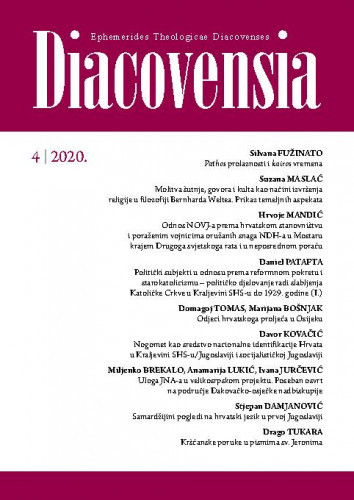U svojoj filozofiji religije Welte je osobitu pozornost posvetio razmatranju onoga što on naziva »izvršenje religije«. Budući da je to izvršenje, među ostalim, potaknuto i čovjekovim traganjem za smislom, prilog započinje Welteovim izlaganjem o nerazdruživoj vezi smisla i religije. Time se pak nužno dolazi do pojma Boga jer je On nositelj smisla. Na tragu njemačke mistike te posebno M. Eckharta, Welte se usteže Boga podvrgnuti svakoj kategorijalnosti te Ga označava pojmovima neizrecivi, beskonačni, skriveni. Kao onomu koji je neizreciv i skriven, Bogu se pristupa molitvom i njezinim oblicima, čime se pokazuje da su upravo to autentični načini čovjekova odnosa prema Bogu: time smo došli do središnje komponente članka, koja je sadržana u predstavlja-nju temeljnih aspekta welteovskoga viđenja molitve – molitva kao šutnja, kao govor i kao kult. Svaki od tih pristupa sadrži svoju osobitost: molitva šutnje nikako nije negacija istinskoga govora; molitvu govora pak u bitnome karakterizira dvopolnost, dok u kultu na poseban način do izražaja dolazi pojam zajednice i s njom okupljačka dimenzija govora. Prilog završava razmatranjem opasnosti u koje izvršavanje religije s obzirom na molitvu i kult može skliznuti. To, kako ga njemački filozof naziva, izopačenje religije predstavlja stari, a uvijek novi problem svake religije: »Ovaj me narod časti samo usnama, a srce mu je daleko od mene.« (Mk 7, 6); In his philosophy of religion, Welte paid particular attention to the consideration of what he called the »practice of religion.« Since this practice is prompted, among other things, by man’s search for meaning, the article begins with Welte’s exposition on the inseparable connection of meaning and religion. This, in turn, necessarily leads to the concept of God because He is the bearer of meaning. Following in the footsteps of German mysticism, and especially M. Eckhart, Welte refrains from subjecting God to any categoricalness and describes Him with the terms unspeakable, infinite, hidden. As one who is unspeakable and hidden, God is approached by prayer and its forms, which shows that these are the authentic ways of man’s relationship toward God: thus we come to the central component of the article, which is contained in presenting the fundamental aspects of Welte’s vision of prayer – prayer as silence, as speech, and as cult. Each of these approaches contains its own peculiarity: the prayer of silence is by no means a negation of true speech; the prayer of speech, on the other hand, is essentially characterized by bipolarity, while in the cult the notion of community and with it the unifying dimension of speech comes to the fore in a special way. The article concludes by considering the dangers into which the practice of religion may slip regarding prayer and cult. This perversion of religion, as the German philosopher calls it, is the old and always new problem of every religion: »These people honor me with their lips, and their hearts are far from me.« (Mark 7:6)
Sažetak

 Diacovensia : teološki prilozi : 28,4(2020) / glavni i odgovorni urednik, editor-in-chief Šimo Šokčević.
Diacovensia : teološki prilozi : 28,4(2020) / glavni i odgovorni urednik, editor-in-chief Šimo Šokčević.